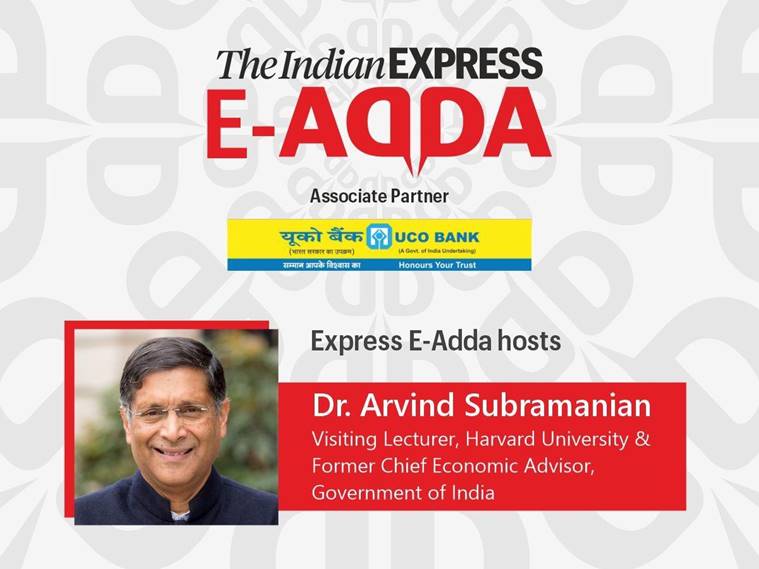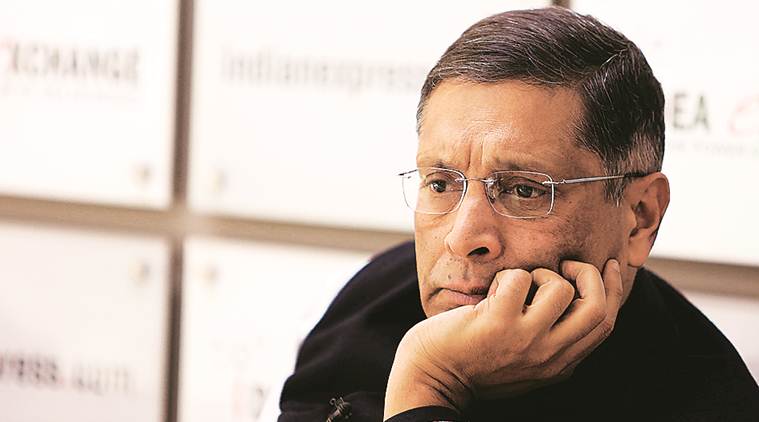 Express Adda LIVE updates: Arvind Subramanian will be in conversation in the Express Adda webinar with Harish Damodaran, National Editor, and P Vaidyanathan Iyer, Executive Editor (National Affairs).
Express Adda LIVE updates: Arvind Subramanian will be in conversation in the Express Adda webinar with Harish Damodaran, National Editor, and P Vaidyanathan Iyer, Executive Editor (National Affairs).
Calling the present economic situation “the pralay of Hindu mythology”, former Chief Economic Advisor Arvind Subramanian, who was the chief guest at the Express Adda, said India should plan for negative growth rates in this financial year.
“There is a huge overhang of liquidity in the market already. There will be a deflationary shock. Prices will be lower than higher. This is the pralay of Hindu mythology,” he says. Subramanian says our food stocks are turning out to be equitable social safety net. “For developing countries like India, the trade off between lockdown and economic activity should be different from developed countries,” he further said.
Subramanian also said while the RBI had lowered rates and made liquidity available, what was required was actual credit flowing to the corporate sector, including small and medium firms.
Pointing out that cooperative federalism could have paved the way to more reforms, Subramanian also said if the JAM trinity could be connected to very household, it would lay the foundation of universal basic income.
Besides discussing the contours of a prudent yet compassionate macro-economic policy framework, Subramanian also spoke on the immediate and medium-term challenges facing the economy, the policy options before leaders, and the trade-offs there in.
 Ex-CEA Arvind Subramanian at the Idea Exchange. (Express Photo/File)
Ex-CEA Arvind Subramanian at the Idea Exchange. (Express Photo/File)
As lockdown opens up and businesses come back to new normal, what are the dangers we should watch out for? To this Subramanian says one should be worried about complacency that may creep in while coming out of the crisis and be realistically aware of NPAs, stressed assets -- which will be much worse.
One way to help the private sector at this stage, Arvind Subramanian says will be to make available the arrears. Subramanian further says sometimes such crisis like these, magnifies pre-existing vulnerabilities. "Globalisation will be different in a post-Covid-19 world. The coronavirus crisis will make US, Europe and China weaker internally. US response to crisis has been worst in the world. Countries which turn the crisis into opportunities should be marked out," he says.
On economic growth forecast for the current fiscal, Arvind Subramanian says policymaking should focus on GDP seeing negative growth. Subramanian further says a GST rate cut is not a correct option at this stage. "Stimulus by way of a tax cut is not good policy because it is a shock to both demand and supply. Stimulating consumption and lockdown cannot be done at same time, it will be counter productive," he says.
Arvind Subramanian says we should work on expanding the testing capacity on a high-priority basis. "This will make our exit from the lockdown more effective," he says. Freddy Svane, Denmark Ambassador, questioned Subramanian on the option of free trade to come out of the crisis. Subramanian said if the JAM trinity can be connected to very household, it wil lay foundation of universal basic income. "In the past 5 years, the biggest Centre-state cooperation was the passage of the GST legislation," he says. Cooperative federalism could have paved the way to more reforms, he further says.
Arvind Subramanian says had we acted sooner on the twin balance sheets, the response could have been better. "Seamless GST and JAM trinity could have helped cope us better with the present crisis. Policy response could have been more forceful had we known about the economic situation," the former CEA said.
On opening up FDI, the former Chief Economic Advisor says there is no doubt that having more foreign direct investment will help the economy. "We dont want excessive concentration on a particular industry. FDI also provodes a competition that keeps a check on monopoly. Large incumbents in any market is detrimental to growth," he says.
Arvind Subramanian says reviving the power and real estate sector should be the focus. On more urban centres continuing to be in the red zone than rural areas amid the coronavirus pandemic, Subramanian says urban service economy will be hit the most. "When we exit from lockdown, we need to take a call on migrant workers. We should allow the urban migrant workers to return to their homes," he says.
On the issue of migrant workers, former Chief Economic Advisor Arvind Subramanian said their access to cash will be limited. "This is the time when people need cash. We should not be reluctant to pump out cash and should be given in people's hands," he says. Subramanian says RBI has lowered rates and made liquidity available but what we need is actual credit flowing to the corporate sector, including small and medium firms.
Former Chief Economic Advisor Arvind Subramanian says for the Indian economy to bounce back quickly, a stimilus package not less than 5 per cent of GDP is required. "There is a huge overhang of liquidity in the market already. There will be a deflationary shock. Prices will be lower than higher. This is the pralay of Hindu mythology," he says. Subramanian says our food stocks are turning out to be equitable social safety net. Normally, there are two social safety nets -- food and cash.
Former Chief Economic Advisor Arvind Subramanian says one month of GDP may be lost for countries due to the lockdown. "IMF forescast for India are mystifying and bizarre. We should plan for negative growth rates in this financial year," he says.
Former Chief Economic Advisor Arvind Subramanian says the world and India is facing an unusual crisis. For developing countries like India, the trade off between lockdown and economic activity should be different from developed countries. "India should prioritise livelihoods. A comprehensive and ramped up testing should be the priority for India," he says.
Welcome to our live blog. In today's Express Adda, which will be hosted by The Indian Express online for the first time, former Chief Economic Advisor Arvind Subramanian is the chief guest. At a time when the economy has taken a hit due to the nationwide coronavirus lockdown, Subramanian will likely reflect on the immediate and medium-term challenges facing the economy, the policy options before leaders, and the trade-offs there in.